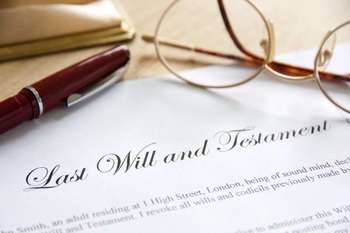 If you are dealing with a will, you may be feeling overwhelmed and pressured. With the help of an attorney, you can make this process of contesting wills smoother.
If you are dealing with a will, you may be feeling overwhelmed and pressured. With the help of an attorney, you can make this process of contesting wills smoother.
Contesting Wills | Probate Process
Because the probate process can be complex, many people are very concerned. Many people ask, “Well, how do we avoid probate?” or “How come we have to probate a will?” When you execute a will at a lawyer’s office, a document entitled a will is created, and certain qualifications must be met in order to ensure that it’s a good will. Normally, the document must be signed by the person who’s making it. That person must be competent and not suffering from any undue influence. The signature generally takes place in front of two witnesses who also must sign. A will ceremony takes place, during which the person executing the will makes certain declarations in front of these witnesses, including that the document is his will, he’s reviewed it, and that he would like the witnesses to sign it. A whole process needs to take place.
Contesting Wills | Executor
When those steps have been completed, the document is said to be purporting to be a will, but it’s not a will yet. A will is designated a valid will, and results in the official appointment of the executor – the person in charge – only after the person dies. At that time, the will goes in front of the surrogate court judge who decides that the document is a valid will and appoints the executor in charge.
Contesting Wills | Distributees
This could be a very simple process where we submit paperwork, pay a filing fee and it’s done. In part, the paperwork must come from the person petitioning to have the will admitted at probate. It must come from the individuals who have a right to contest that will. A specific group of people, known as distributees, can contest a will, as can another group of people – people who are adversely affected. Distributees are individuals who would take a distribution from an estate if there were no will. For example, if I create a will leaving everything to my friend, my spouse and children could contest that will claiming, if the will were not valid, they would get my entire estate – and they are the only people who could contest my will. My parents could not contest it. Neither could my first cousins. That right applies only to those who would take if there were no will.
Download Our Free Estate Planning Guide
Contesting Wills | Negative Reactions
One other group of people, individuals who are adversely affected by a prior will, could also object to my will. That option would apply if I had named certain individuals in a prior will and that prior will still have existed.
Contesting Wills | Submitted Probate
The critical point of this process is to ensure that, when a will is submitted for probate, proper notice is given to those individuals who can contest it. The easiest way to probate a will is to have those people who could contest is sign a waiver that essentially says, “We’re good.” There are documents that must be submitted, and most wills are probated pretty much that way. Occasionally, that isn’t possible and these people must be provided appropriate notice of a court date, either through certified mail or by process servers. They then have the right to come to court and say, “I want to object to this will.” As I tell people, this is not an easy process. Only a few grounds enable you to contest a will, including alleging that the person who created it was incapacitated – usually mentally – on the date the will was created. That’s the first grounds.
Contesting Wills | Undue Influence
The second potential ground is that of undue influence. It could be opined that somebody unduly influenced the maker of the will. One classic case would be that of a healthcare provider who said, “Listen. I’m going to leave you here. Nobody is going to take care of you. You’re going to die here unless you see my lawyer and have everything go to me.” Granted, that’s an extreme case, and you can also have a simple mistake of fact that the person is confused. Then there’s something wrong with the will procedure.
Contesting Wills | Witnesses
It is very difficult to contest a will. Remember, two witnesses were present at the signing. Those two witnesses said, “Hey. That person signed the will in front of me, and he knew what he was doing. He understood what he was doing, and he seemed competent to me when I signed the will.” If you’re going to object to the will, you’ve got to overcome the testimony of those folks. While you might be able to do it in certain cases, success will require a significant amount of evidence, testimony – and maybe medical testimony – to prove that that will isn’t valid.
Contesting Wills | Overturning
Very few attorney-drawn wills, particularly in Western New York, are overturned. It does happen occasionally, but very seldom. That doesn’t mean that cases alleging a problem with the will cannot be made. In certain situations, will contests do go on and wills are settled. Estates are settled. People say, “All right. I’ll give you this,” or “I’ll give you that and we’ll split it this way.” We don’t have to go in front of a judge. That does happen but will contests are not for the faint of heart. You need a lot of verifiable facts and a lot of evidence – and they’re expensive.
If you need legal representation, please call our Buffalo estate planning lawyers today.
